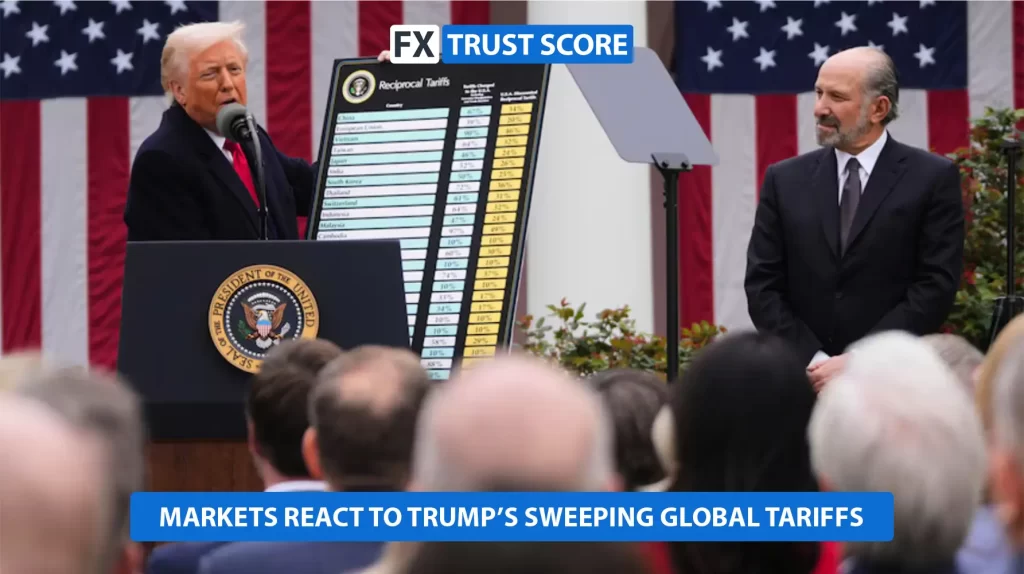Markets around the world tumbled after President Trump’s bombshell tariff announcement sparked panic among global leaders and the wider international community.

Tumbling Stock Markets As Trump Announces Tariffs
Stock markets across the world tumbled on Thursday as the aftershock to Donald Trump’s sweeping tariffs plan reverberated around the entire international community. To the surprise of many, no country has been spared from the US president’s “Liberation Day” levies, announced on Wednesday.
In a landmark moment in the history of global trade relations, a minimum 10% tariff has been applied on all countries, with additional levies imposed on more than 60 nations who US officials deem to be the “worst offenders”. Most of the tariffs come into force on the 5th April 2025.
Europe Feels The Ripple Effects Of New US Measures
As Europe woke up to the reality of Trump’s plan on, stock markets fell sharply at the open, with London, Paris and Berlin all feeling the ripple effects of the US measures. The FTSE 100 was down around 1.4%, the CAC 40 dropped by 1.7%, while Germany’s Dax Index plummeted by more than 2%.
In the US, futures tied to the Dow Jones Industrial Average lost 992 points, a fall of around 2.3%. The S&P 500 was down 2.8% and the Nasdaq-100 dropped 3.06%. As for the fortunes of the leading multinationals, Nike, Apple and Tesla shares were all down by 7%. Unsurprisingly, the largest sellers of imported goods experienced the sharpest declines, with Five Below, Dollar Tree and Gap each plunging 14%, 11% and 8.5% respectively.
Amid the ongoing uncertainty, the euro fell slightly against the US dollar but remained above 1.08, while commodity-linked currencies, including the Canadian dollar, Australian dollar, and New Zealand dollar, all fell sharply against the greenback. On the other hand, safe haven assets surged considerably, with gold rising to a new record high and the Japanese yen also strengthening.
What Tariffs Has Trump Announced?
Trump has introduced a whole host of tariffs, with varying degrees of severity, according to calculations relating to trade deficits made by senior US officials.
- 10% – Baseline tariff on all countries
- 25% – Tariffs on all foreign-made car imports
- 10% – Maximum tariff for selected countries, including: the United Kingdom, Singapore, Brazil, Australia, New Zealand, Turkey, Colombia, Argentina, El Salvador, United Arab Emirates, Saudi Arabia
- 20% – European Union (EU)
- 24% – Japan
- 30% – South Africa
- 32% – Taiwan
- 36% – Thailand
- 46% – Vietnam
- 49% – Cambodia
- 54% – China (including earlier tariffs)
What Did Trump Have to Say?
During an address in the White House Rose Garden, in his trademark bullish style, Trump declared that April 2 “will forever be remembered as the day American industry was reborn, the day America’s destiny was reclaimed, and the day we began to make America wealthy again.”
“Our country and its taxpayers have been ripped off for more than 50 years, but it isn’t going to happen anymore,” he added. “Reciprocal. That means they do it to us, and we do it to them. Very simple. Can’t get any simpler than that. We will charge them approximately half of what they are and have been charging us… So, the tariffs will not be fully reciprocal.”
How Have World Leaders Responded to Trump’s Tariff Plan?
UK prime minister Keir Starmer highlighted the need for “cool heads” in a speech to business leaders, saying, “Our intention remains to secure a deal, but nothing is off the table.” He added: “Today marks a new stage in our preparation. We have a range of levers at our disposal and we will continue our work with businesses across the country to discuss their assessment of the options.”
Meanwhile, European Commission president Ursula von der Leyen warned of “dire consequences” for millions of people, before stating that tariffs would “hurt consumers around the world.” She remarked that there was “no clear path through the complexity and chaos that is being created as all US trading partners are hit,” but emphasised that the EU’s unity “is our strength”, with the bloc fully prepared to respond with its own countermeasures.
Elsewhere, China’s ministry of commerce called on the US to “immediately cancel” the tariffs, warning that it would “resolutely take countermeasures to safeguard its own rights and interests.” Taiwan, another country hit hard by the sanctions, described the move as “highly unreasonable”. Japan called the levy “extremely regrettable” and added that it could be in violation of World Trade Organization (WTO) and US-Japan agreements.
What Happens Next?
With no single country immune from Trump’s tariffs, these measures are set to have an unprecedented global impact spanning every continent – even remote islands and external territories have not been spared Trump’s wrath.
In terms of a timeline, the universal tariffs come into effect on April 5th, with the reciprocal ones beginning on April 9th, meaning affected nations have an extremely limited time period in which to implement a plan of action and decide on a suitable response.
Some may seek to negotiate a deal with Trump, while others may choose to go up against the US with their own retaliatory tariffs. One thing is for sure: uncertainty will be the dominant theme in the days, weeks and months ahead.
Did you find this piece interesting and informative? Check out more FX Trust Score Market News.






